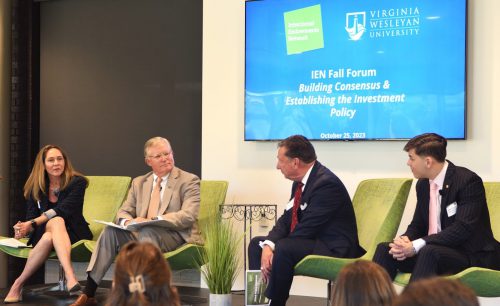Featured Image: The IEN Fall Forum hosted Ali Bayler, VWU Portfolio Manager; President Scott D. Miller; VWU Trustee Gary Bonnewell ’79; and VWU senior Rowan Stuart in Brock Commons, seated on a stage. VWU Communications | Courtesy
Virginia Wesleyan handles millions of dollars in various endowment practices, and decisions regarding them have a profound impact on the university’s future. On Oct. 25, VWU hosted the Intentional Endowments Network Fall Forum to discuss where this money goes. Speakers at the forum also explained ways these funds go toward benefiting students.
The conference focused on balancing returns with institution values, especially those pertaining to the environment. The topics discussed ranged from university investment to diversity and inclusion practices.
“There was great passion in the room about pushing investment policy to support sustainability and social equity,” junior Jessica Wilson said, who holds the role of Co-Lead in the IEN.
The Intentional Endowments Network’s goals are stated as to “leverage the immense assets of educational institutions towards creating a sustainable economic landscape.” In total, higher education controls almost $650 billion in endowments, giving them power to promote sustainable businesses.
Miller spoke on how this holds up at VWU. “Environmental principles embedded in all policies on campus, standing the test of time,” Miller said. Recent endowments, meaning donations to the university, have increased financial aid and established stronger academics.
Around $120 million dollars are currently managed in VWU’s portfolio. During the investing process, IEN members helped guide the college with ESG (Environmental, Social, Governance) principles.
ESG principles help mitigate the consequences of short-term investing. By fully researching company’s choices within these guidelines, institutions can make investments that reduce climate change and inequalities.
Rob Andrejewski, University of Richmond’s Sustainability Officer, said, “The new language such as ESG is complicated, but allows us to communicate ideas in a clearer manner.” Even for non-business majors, learning common words surrounding sustainability can promote its use in every industry.
“I learned how to view environmental stewardship less as a static concept and more as a continually ongoing process,” Andrejewski said. As new data is released and new studies are conducted, investors will need to adapt.
External organizations bring resources to the VWU campus to promote ESG and sustainability practices. Brown Advisory donated $50,000 for the student investment portfolio. The results of these funds can be seen in Clarke Hall through resources that offer students hands-on experiences with finances.
Wilson spoke on how understanding investment is not exclusive to higher-ups. She said that individuals can take direct action by making environmentally responsible decisions about their own investments. “You are helping shift capital to drive the sustainability transition,” Wilson said.
Wilson said her biggest takeaway from the forum was that ESG funds do not have to limit profitability. “Funds that exclude oil companies or that have a required minimum of minority-owned businesses are just as competitive,” Wilson said. However, she said that both the public managers with the power to make those decisions require better awareness of this “to push forward sustainability and equity.”
President Miller’s Nota Bene, published Oct. 30, praised the IEN Forum and said, “Virginia Wesleyan University continues to be recognized as a national leader in ESG investing. Hosting the IEN Fall Forum at our campus reaffirms our dedication to sustainable endowment management.”
By Elliot Fylstra

